When, in those innocent days of 2012, this little experiment in movie musings began its soon-to-be world famous run, we opened with thoughts on how Ridley Scott’s Prometheus, so impressive in its visuals, could have been, in ways both small and all-encompassing, a bit less stupid. This was followed by a piece on spoilers inspired by The Grey, a movie featuring Liam Neeson fighting wolves in a snowy forest.
Since them, Prometheus, while still engaging for its big squishy monsters, has become no less stupid. But The Grey…The Grey has become far more intriguing a film. Is it, after all, merely an unrealistic, snowbound action movie about Liam Neeson and his pals battling improbably giant wolves post-plane crash? Or is it the vision of a man who either has or is about to commit suicide? Or then again, is it a metaphysical exploration of death, demons, heaven, and purgatory as described in the poetry of William Blake?
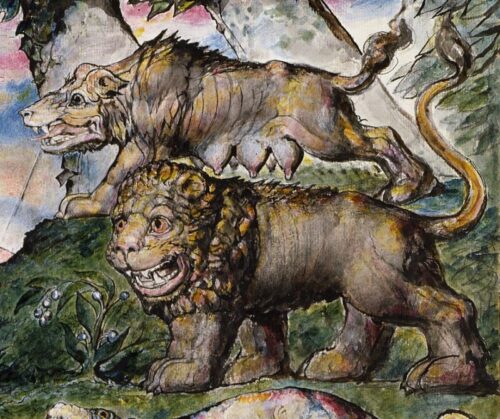
Twelve years ago The Evil Genius opined that it doesn’t matter, at the end of The Grey, that we are given no resolution to the fight between man and wolf:
“It doesn’t matter because it is not happening. What is happening, is that Ottway is deciding to live. Ottway, seeing the end of his existence at hand, chooses instead to fight for another day…”
In the comments to this post, yours truly opined that this was too kind a reading of the film, that the filmmakers had no intention of suggesting the events of the film to be merely in Ottway’s imagination.
A reader, Simon, took things quite a bit further in the comments that followed, stating that:
“The Movie is an homage to Blake. It is so William Blake that it is the ultimate tribute and an absolute refutation to all faiths and religions and that God exists as a benevolent being. God punishes…Ottway is effectively a lost soul trapped in eternal purgatory…”
Simon goes on to quote Blake’s poetry, poetry that is notably apt when laid over the events of The Grey. So too is Blake’s belief in a specter apt, his belief in a shadow self, which he may have seen as literal, as a being who appeared to him, who was his dark half, his demon self. Simon concludes:
“Is the wolf a demon? Is this an admission of heaven and hell? I think at this point I will stop.”
A wise choice, to stop there, lest he go as mad as Blake. Knowing that Simon, as well as the many, many millions reading his comments, would need ample time to recapture some measure of sanity after his plunge into Blake’s icy wilderness, I promised in a subsequent comment to wait three years before responding. After all, we don’t like to rush things here at SB4MC. While you wait, why not take the time to read every comment on the original post? What else are you going to do? Read about politics? You’d be better off going mad with Blake and Liam Neeson.
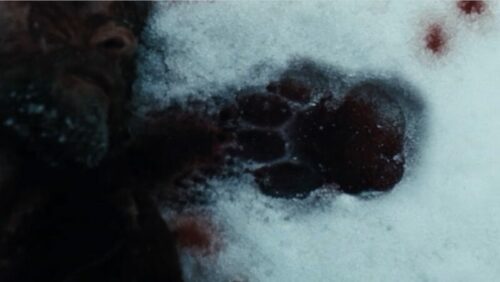
Good? Good. It has now been three years. Time to talk about the demons.
But first, an admission. When I first watched The Grey, I thought it was a movie about Liam Neeson fighting wolves in a snowy forest. I was wrong. I’ve in the 12 years since watched it two more times. It keeps getting better. Which one would not expect to say of a movie about Liam Neeson fighting wolves in a snowy forest. But that’s because Liam Neeson is not fighting wolves in a snowy forest. He’s fighting demons.
The Grey isn’t a dying man’s dream. That’s too literal. But the movie is, as we all sort of came around to agreeing on in the comments, an allegory. I opined that it was a poor allegory, possibly half-accidental. Well—I take it all back. Nothing is accidental. It’s demons. DEMONS!
The wolves are demons of a particular sort. They are emissaries of death–of Death. Are they, per Simon, an admission of heaven and hell? This too is too literal. We’re not talking actual religious realms in some imagined afterlife. We’re talking about metaphor, and we’re talking about demons. The film shows us that to live we must fight. We must struggle. We must want to live. We are chased by demons through the snowy wilderness of existence we’ve by no fault of our own crash-landed into. If we want to live, we have to fight the demons whose home this is. As far as matters of religion go, our heroes find that it’s no help. Neeson, as Ottway, seems able to bring a man peacefully into the realm of death in the aftermath of the crash. What does this make professed atheist Ottway? Later, he insists they leap over some kind of gorge to the trees beyond. They take this leap of faith. One man dies; one is injured (he will later die because of it). Another man gives up, asks only to sit and await his fate; Ottway fails to change his mind. A last man faces a kind of baptism in the creek, in which he becomes trapped. Ottway struggles to save him. He fails. The man dies.
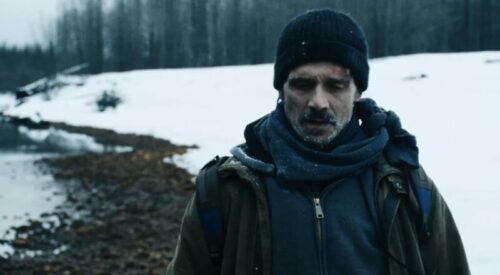
To live, you have to want to live. Which, sure. That’s nice enough, as far as it goes. But it’s how the movie ends that tips it into the shadowy realms of Blake’s poetry, of being haunted by your demon doppelganger, of the doom the demons represent.
Ottway and his pals spend the movie running from the demons. But where do they wind up? The demons’ den, the home of Death. Action movies make a boring habit of suggesting you have to fight to live. But when has one taken this fact to its inevitable conclusion? I am reminded of the Guide To Living In Three Easy Steps:
Step 1: Be born
Step 2: Try not to die
Step 3: Die
You must fight the demons to live. Fail in your fight, give up the fight, make one tiny mistake, or simply admit defeat, sit down, and wait for the inevitable, and die. But in the end, where does successfully fighting off the demons get you? The very same place. We don’t see the result of the final fight in the movie because we know the result. There is only one ending. It lives in that den, and it waits for us all.
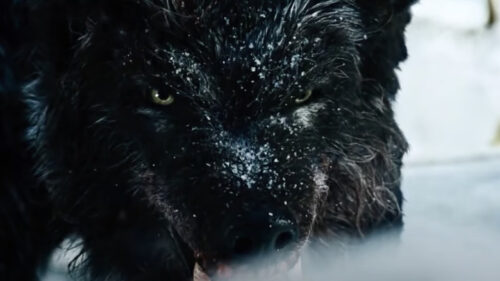
In the comments to the original post, I mistakenly lamented the seeming dopiness of the film’s unrealistic action scenes, calling them “glossed over.” I made this mistake because I’d made the mistake of assuming the wolves were actually wolves, and that Ottway and his pals were fighting them in a snowy wilderness, when in fact they are demons, and the wilderness is life. The film is precisely realistic in its portrayal of the fight against death’s emissaries, in how different people take on the fight, or fail to, and in what, for everyone, that fight results in. The film charts an existential struggle, not a real-life encounter with woodland wolves.
It’s demons all the way down.
On its surface The Grey is a little ripe. A little overcooked. The dialogue leans toward the overwrought. But this problem fades when you realize The Grey isn’t set in a real, literal world, but in an interior metaphysical wilderness from which none of us will ever emerge. Ripe dialogue plays better under these circumstances.
I acknowledge that to some it may sound cruel for me to suggest–to insist–that you rewatch a movie about Liam Neeson fighting wolves in a snowy forest. But I’m afraid you must. Because many of you–you know who you are (I was once one of you)–watched the wrong movie the first time around. You watched for wolves, when you should have been watching for demons. They’re not just circling Liam Neeson. They’re circling you. See you later, once we’ve made our escape. Once we’ve reached their den.
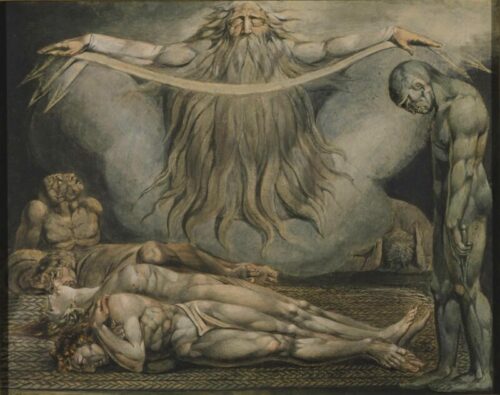

Right? Right.
I will rewatch the Grey and be glad to do so, cogitating on your demon-spawn themes as I do. Are you right? Am I right? Should we fight—to the death?
It doesn’t matter. We’re going to die anyway. But it is nice to know that eventually you have come around to appreciating the Grey for being, well, not so black and white.
I have had this on my rewatch list for ages. I remember really enjoying it first time around. I watched Carnahan’s Narc again not too long ago. That movie really held up.
Hope you guys are well. Are you on Letterboxd at all?
Well, well well! If it isn’t Mash! Welcome back old friend. We are doing fine, American politics aside. Older, perhaps wiser, definitely Grey-er. And you? Not on Letterboxd but maybe Supreme Being is? Haven’t seen Narc. I will add it to the list.
Greetings! Huh. I don’t think I ever saw Narc either. Or did I? Well. Since everyone else is going to watch it, I’d better too. Nope, not on Letterboxd, though I’ve come to understand that everybody else is. I should probably give some thought to thinking about whether I should consider joining it.
Not sure how to reply to both. I’m good, just busy with work. Definitely greyer, just turned 44 a few weeks ago. Looking forward to the Christmas break.
I was looking for the piece you wrote about The Color of Money, my nephew watched it a couple of weeks ago and called me half way through to tell me how amazing it was lol. Raised these boys well.
I came across the pieces on Harper and The Drowning Pool as well, I watched both during lockdown. I enjoyed them, first one more than the second. Going to read those now.
Narc is great. There’s a dingy dirty quality to that film that makes it feel like a 70s throwback. Reminiscent of William Friedkin, especially the griminess of The French Connection. Watching it again for the first time since it came out I felt sad that Carnahan never really took off. He was supposed to make Mission Impossible 3 back then, which never happened. I think The Grey is the one that is closest to what we might consider the path he would have tread if he didn’t end up making studio stuff like The A Team. Looking forward to a rewatch.
I’m on LB > https://letterboxd.com/Mash/